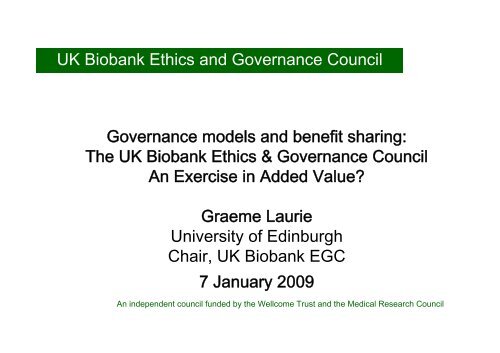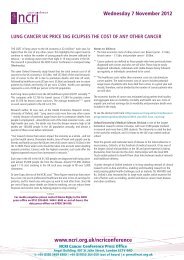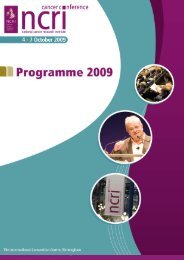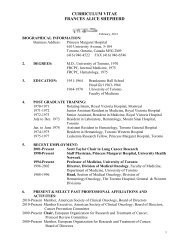The UK Biobank Ethics & Governance Council A
The UK Biobank Ethics & Governance Council A
The UK Biobank Ethics & Governance Council A
Create successful ePaper yourself
Turn your PDF publications into a flip-book with our unique Google optimized e-Paper software.
<strong>UK</strong> <strong>Biobank</strong> <strong>Ethics</strong> and <strong>Governance</strong> <strong>Council</strong>• Introduction to <strong>UK</strong> <strong>Biobank</strong> and the EGC• In principle: Why is there an independent <strong>Council</strong>?• In practice: <strong>The</strong> EGC and its work• Going beyond law?• Providing additional privacy protection?• Balancing privacy & access?• Exploring benefit sharing and public interest?• Conclusions
<strong>UK</strong> <strong>Biobank</strong> <strong>Ethics</strong> and <strong>Governance</strong> <strong>Council</strong>1. Introduction to <strong>UK</strong> <strong>Biobank</strong> and the EGC• <strong>The</strong> purpose of <strong>UK</strong> <strong>Biobank</strong> is ‘to provide a resourcefor research with the aim of improving the prevention,diagnosis and treatment of illness and promotinghealth throughout society for public benefit.’• <strong>The</strong> resource is expected to contain health andlifestyle data and biological samples from 500,000voluntary participants from the <strong>UK</strong> aged 40-69.
<strong>UK</strong> <strong>Biobank</strong> <strong>Ethics</strong> and <strong>Governance</strong> <strong>Council</strong>Participation involves• providing information about health, lifestyle, memory, workand family history• undergoing some physical measurements (includingblood pressure, pulse rate, height and weight)• providing biological samples (including blood and urine)• allowing <strong>UK</strong> <strong>Biobank</strong> to access information fromindividual NHS medical records• granting consent for researchers to access data andsamples for uses that meet the purposes of the project.
<strong>UK</strong> <strong>Biobank</strong> <strong>Ethics</strong> and <strong>Governance</strong> <strong>Council</strong>Two notable governance features:• <strong>Ethics</strong> and <strong>Governance</strong> Framework• <strong>Ethics</strong> and <strong>Governance</strong> <strong>Council</strong>
<strong>UK</strong> <strong>Biobank</strong> <strong>Ethics</strong> and <strong>Governance</strong> <strong>Council</strong><strong>UK</strong> <strong>Biobank</strong> <strong>Ethics</strong> & <strong>Governance</strong> Framework (1 of 2)• Establishes that consent will be sought ‘to ‘participate in <strong>UK</strong><strong>Biobank</strong>’. This is based on an explanation and understanding ofa number of features of participation (such as the kinds ofinformation and samples that will be collected at enrolment, thepossibility of being re-contacted in future by <strong>UK</strong> <strong>Biobank</strong> and abroad description of potential research uses of data).• Affirms the right to withdraw at any time.• Makes a commitment to protect the confidentiality of bothsamples and data.
<strong>UK</strong> <strong>Biobank</strong> <strong>Ethics</strong> and <strong>Governance</strong> <strong>Council</strong><strong>UK</strong> <strong>Biobank</strong> <strong>Ethics</strong> & <strong>Governance</strong> Framework (2 of 2)• Confirms <strong>UK</strong> <strong>Biobank</strong>’s role as steward of the resource andlegal owner of the database and the sample collection.• Describes the principles which govern access to the resourceby researchers.• Describes the broad benefit-sharing that will be required(including the obligatory publication of findings and accessiblearchiving of data and findings for future use).
<strong>UK</strong> <strong>Biobank</strong> <strong>Ethics</strong> and <strong>Governance</strong> <strong>Council</strong><strong>The</strong> independent <strong>Ethics</strong> and <strong>Governance</strong> <strong>Council</strong>• Monitors <strong>UK</strong> <strong>Biobank</strong>’s conformance with the <strong>Ethics</strong> and<strong>Governance</strong> Framework.• Advises the project on revisions to the Framework.• Advises <strong>UK</strong> <strong>Biobank</strong> on the interests of the participantsand public in relation to the project.• Members are appointed by the Medical Research<strong>Council</strong> and the Wellcome Trust following Nolanprinciples.
<strong>UK</strong> <strong>Biobank</strong> <strong>Ethics</strong> and <strong>Governance</strong> <strong>Council</strong>RelationshipsT<strong>Ethics</strong> and<strong>Governance</strong><strong>Council</strong>AccountableFunds(WT and MRC only)Oversees and advisesFundersDepartment of Health for England and WalesMedical Research <strong>Council</strong>Scottish ExecutiveWellcome TrustNorth West Development AgencyFundsAccountableAccountable<strong>UK</strong> <strong>Biobank</strong> Ltd(<strong>UK</strong> charitable company)collaborating with 22 universities through 6Regional Collaborating Centres
<strong>UK</strong> <strong>Biobank</strong> <strong>Ethics</strong> and <strong>Governance</strong> <strong>Council</strong>• In principle: Why is there an independent<strong>Council</strong>?
<strong>UK</strong> <strong>Biobank</strong> <strong>Ethics</strong> and <strong>Governance</strong> <strong>Council</strong>Research governance and regulation• Legislation (e.g. Human Tissue Act 2004, Mental CapacityAct 2005, Data Protection Act 1998)• Regulators (Human Tissue Authority, InformationCommissioner's Office; Charity Commission, CompaniesHouse)• Other governance mechanisms (research ethics committees,NHS as data controller)• Good practice (e.g. MRC, professional bodies etc)
<strong>UK</strong> <strong>Biobank</strong> <strong>Ethics</strong> and <strong>Governance</strong> <strong>Council</strong>Research governance and regulation: a critiqueKaye & Gibbons (Medical Law International, 2008):• Undue complexity, yet framework remains incomplete• Over-dependent on self-regulation or 'soft' options• Legitimacy deficit:- lack of transparency- lack of accountability- lack of consistency
<strong>UK</strong> <strong>Biobank</strong> <strong>Ethics</strong> and <strong>Governance</strong> <strong>Council</strong>Ethical governance and the creation of the EGCWhy have an <strong>Ethics</strong> and <strong>Governance</strong> <strong>Council</strong>, in addition?• <strong>The</strong> breadth of the project’s purpose (broad consent)• <strong>The</strong> long term nature of the endeavour• Limitations in the remit of existing mechanisms, e.g.monitoring research was not in REC remit• Public engagement exercises showed support.An additional safeguard and a foundation of trust – thetrusted third party.
<strong>UK</strong> <strong>Biobank</strong> <strong>Ethics</strong> and <strong>Governance</strong> <strong>Council</strong>3. In practice: <strong>The</strong> EGC and its work• Established in November 2004 (17 meetings)• A multi-disciplinary group that draws together a widerange of expertise in law, ethics, biomedical science, socialscience, policy and consumer issues• 12 members (on-going recruitment)• Meets 4 times a year and holds at least one publicmeeting per year
<strong>UK</strong> <strong>Biobank</strong> <strong>Ethics</strong> and <strong>Governance</strong> <strong>Council</strong>Relationship with <strong>UK</strong> <strong>Biobank</strong>In advising, reviewing and reporting on <strong>UK</strong> <strong>Biobank</strong>’sactivities, the EGC will serve as a “mirror” for <strong>UK</strong> <strong>Biobank</strong>,providing critical and constructive advice.Things the EGC has not been established to do:• Assume responsibility for the ethical management ofthe resource• Speak on behalf of <strong>UK</strong> <strong>Biobank</strong> (instead the <strong>Council</strong>speaks about <strong>UK</strong> <strong>Biobank</strong>)• Own and develop the EGF and associate policies
<strong>UK</strong> <strong>Biobank</strong> <strong>Ethics</strong> and <strong>Governance</strong> <strong>Council</strong>Reflecting the changes in the <strong>UK</strong> <strong>Biobank</strong> project<strong>The</strong> focus of the EGC’s remit has changed over time:• Advisory: <strong>The</strong> EGF and associated policies/procedures• Monitoring: Complaints and enquiries• Foresight: Access procedures
<strong>UK</strong> <strong>Biobank</strong> <strong>Ethics</strong> and <strong>Governance</strong> <strong>Council</strong>Privacy concerns: withdrawal from <strong>UK</strong> <strong>Biobank</strong> (1 of 2)“No further use": In addition to no longer contacting theparticipant or obtaining further information, <strong>UK</strong> <strong>Biobank</strong> willdestroy all of their health-related information and samplescollected previously (although the participant would be told thatit may not be possible to trace and destroy all distributedanonymised sample remnants)... (emphasis added)
<strong>UK</strong> <strong>Biobank</strong> <strong>Ethics</strong> and <strong>Governance</strong> <strong>Council</strong>Privacy concerns: withdrawal from <strong>UK</strong> <strong>Biobank</strong> (2/2)• “No further use": This means that, in addition to no longercontacting you or obtaining further information about you, anyinformation and samples collected previously would no longerbe available to researchers. <strong>UK</strong> <strong>Biobank</strong> would destroy yoursamples (although it may not be possible to trace all distributedsample remnants) and would only hold your information forarchival audit purposes. …• EGF and information leaflet revised• New pages on <strong>UK</strong> <strong>Biobank</strong> and EGC website
<strong>UK</strong> <strong>Biobank</strong> <strong>Ethics</strong> and <strong>Governance</strong> <strong>Council</strong>Policy on the feedback of health informationCurrently: limited feedback of measures taken during theassessment centre visit only. No feedback of subsequentfindings.Proposed new data collection re: MRIs needs to beconsidered in light of this policy - is the policy appropriateto the proposed new measures and questionnaires?
<strong>UK</strong> <strong>Biobank</strong> <strong>Ethics</strong> and <strong>Governance</strong> <strong>Council</strong>Access and intellectual property: challenges1. Who should have access, who decides and how?2. How are scientific decisions taken which mightrequire use of (depletable) samples?3. What role might an Access Committee play? Andwhat of an <strong>Ethics</strong> <strong>Council</strong>?4. What IP policies or principles should guide use ofthe resource?5. What might benefit sharing look like in practice?
<strong>UK</strong> <strong>Biobank</strong> <strong>Ethics</strong> and <strong>Governance</strong> <strong>Council</strong>Core principles and the EGF<strong>UK</strong> <strong>Biobank</strong> is a managed research resource for public good.− Access is to be managed in order to:•Protect participants, honour commitments made tothem and act within the scope of their consents;•Ensure compliance with legal and regulatoryrequirements•Prioritise access to those parts of the resource thatare limited in availability (i.e. samples that aredepletable);•Manage intellectual property rights in the resourceand the results that flow from it.
<strong>UK</strong> <strong>Biobank</strong> <strong>Ethics</strong> and <strong>Governance</strong> <strong>Council</strong>Core principles and the EGFSubject to these constraints, <strong>UK</strong> <strong>Biobank</strong> willencourage and provide access to the resource andthe results that flow from it as widely and openly aspossible in order to maximise its use and value forresearch.This will include access for researchers from theacademic, commercial, charity and public sectors,both in the <strong>UK</strong> and overseas.
<strong>UK</strong> <strong>Biobank</strong> <strong>Ethics</strong> and <strong>Governance</strong> <strong>Council</strong>Non-AccessPara 1.2.5:No identifiable individual’s test results will be providedto their doctors, their relatives or anyone else (e.g.employers or insurance companies). Nor will <strong>UK</strong><strong>Biobank</strong> allow access to the resource by the police,security services or lawyers, unless forced to do soby the courts, and it will resist such access (inparticular by seeking to be represented in all courtapplications).
<strong>UK</strong> <strong>Biobank</strong> <strong>Ethics</strong> and <strong>Governance</strong> <strong>Council</strong>Benefit sharing− <strong>UK</strong>B is managed for the public good− Users to disseminate results as widely and rapidlyas possible (with caveats)− Encouraged to share findings and data as openlyas possible− Copy of all results to <strong>UK</strong>B, including negativefindings for use by others (even if there is IP)
<strong>UK</strong> <strong>Biobank</strong> <strong>Ethics</strong> and <strong>Governance</strong> <strong>Council</strong>Benefit sharing: do we expect too much?Entitlement- “Common Claim” (common heritage)- “Giving Back” (commodity exchange)- “Feeding Back” (obligation/incentivisation?)Deficit- Democratic- Participatory- LegitimacyJustice- Distributive: “Passing on”- Retributive: “Profit Pay-Off”
<strong>UK</strong> <strong>Biobank</strong> <strong>Ethics</strong> and <strong>Governance</strong> <strong>Council</strong>Benefit sharing as the right kind of governance?Benefit sharing can take the form of a number of realitiesIs there a necessary link between benefit sharing andgood governance?<strong>Governance</strong> must take many different forms to respond tomany kinds of biobanks/benefitsPopulation-based studies for the public good
<strong>UK</strong> <strong>Biobank</strong> <strong>Ethics</strong> and <strong>Governance</strong> <strong>Council</strong>Advising for the public good/public interest− <strong>UK</strong> <strong>Biobank</strong> <strong>Ethics</strong> & <strong>Governance</strong> Framework:“<strong>The</strong> <strong>Ethics</strong> and <strong>Governance</strong> <strong>Council</strong> will keep useof the resource under review in order to advise onconformance with this Framework and the IP andAccess Policy, and to assure itself, and others, thatthe resource is being used in the public interest.”− EGC Commissioned report on public interest andthe public good (Capps, Campbell & ter Meulen2008)
<strong>UK</strong> <strong>Biobank</strong> <strong>Ethics</strong> and <strong>Governance</strong> <strong>Council</strong>Advising for the public good/public interest− EGC Living Document on “Advising on the publicinterest and the public good” (2008)“Public interest may be seen as a system to whichall, or a majority of, reasonable individuals wouldapprove and which promotes accepted communityvalues and goods while not leaving individualsdisproportionately or irrevocably worse off.”
<strong>UK</strong> <strong>Biobank</strong> <strong>Ethics</strong> and <strong>Governance</strong> <strong>Council</strong>Advising for the public good/public interest− EGC Living Document on “Advising on the publicinterest and the public good” (2008)“Public interest should not be thought of as aconglomeration or amalgam of individual interests.If measured as a sum of opinion, it can lead touncertainty, whims and “tyranny of the majority”.This has lessons for the value of public attitudesurveys and the way they are used to inform adviceand policy.”
<strong>UK</strong> <strong>Biobank</strong> <strong>Ethics</strong> and <strong>Governance</strong> <strong>Council</strong>Privacy and public attitudes− Concerns about commercialisation− Commissioned research on public attitudes to thirdparty access (Webster et al, 2008):•Data security/anonymity•Ambivalence on police access policy•Heightened concerns about internationalaccess/transfer
<strong>UK</strong> <strong>Biobank</strong> <strong>Ethics</strong> and <strong>Governance</strong> <strong>Council</strong>EGC: An exercise in added value?− An <strong>Ethics</strong>+ approach− An exercise in reflexive governance− Public engagement and public commitment− Commissioning research− EGC Review 2008 - future challenges:•Evolutionary nature of project•Responsive role/Pro-active role•<strong>The</strong> challenges of internationalisation
<strong>UK</strong> <strong>Biobank</strong> <strong>Ethics</strong> and <strong>Governance</strong> <strong>Council</strong>EGC Public event: Thursday 12 February 2009,<strong>The</strong> Royal Hotel, 10 St Mary Street, Cardiff, 6pmContact: EGCinfo@wellcome.ac.ukWebsite: www.egcukbiobank.org.uk






